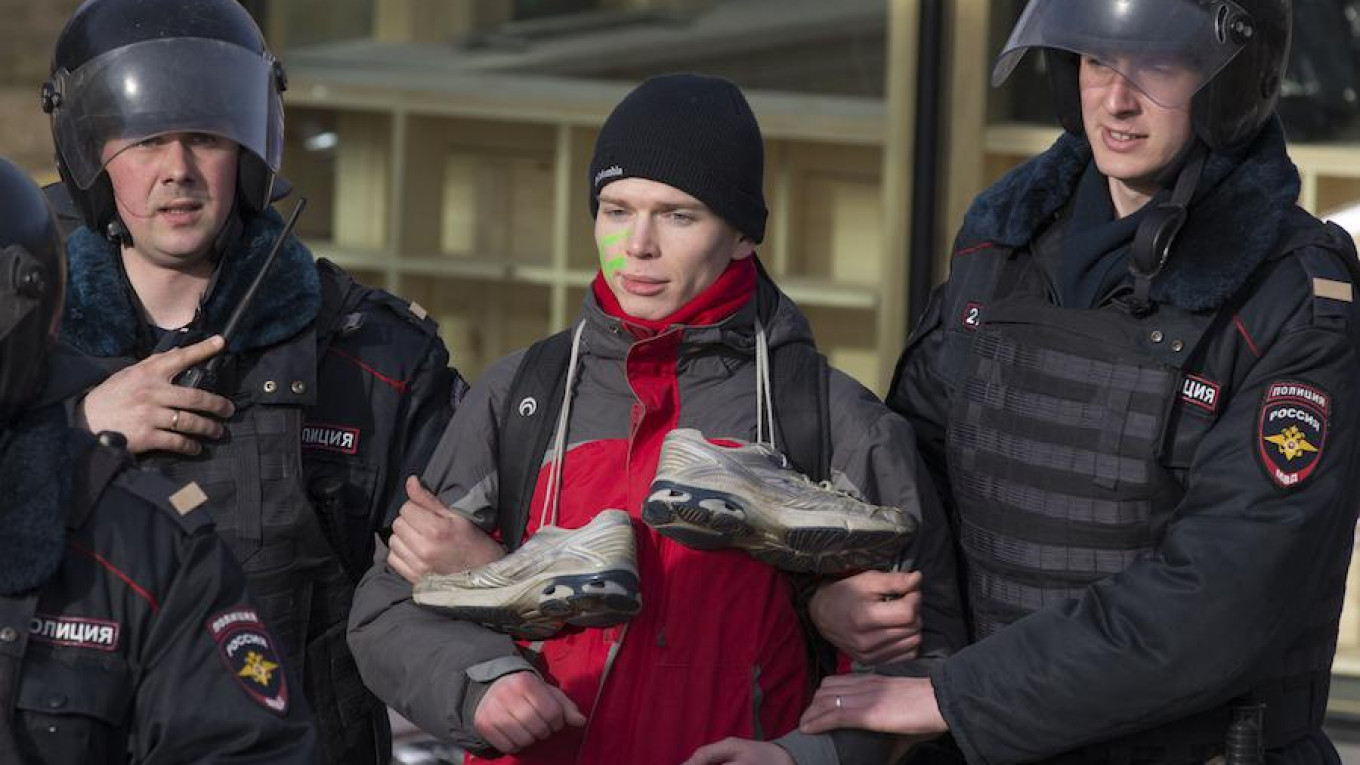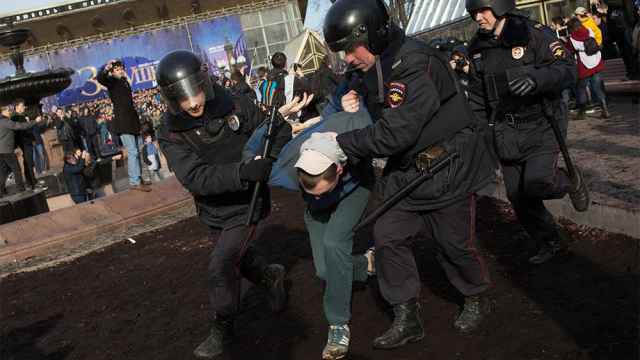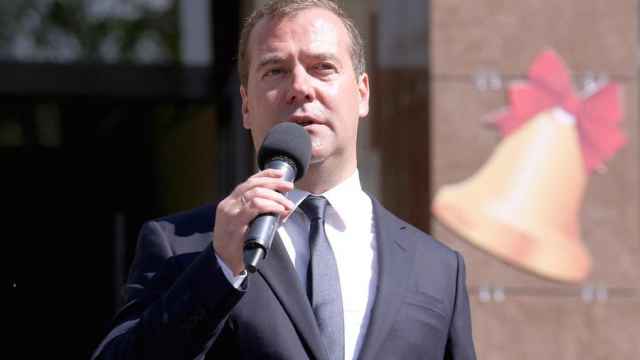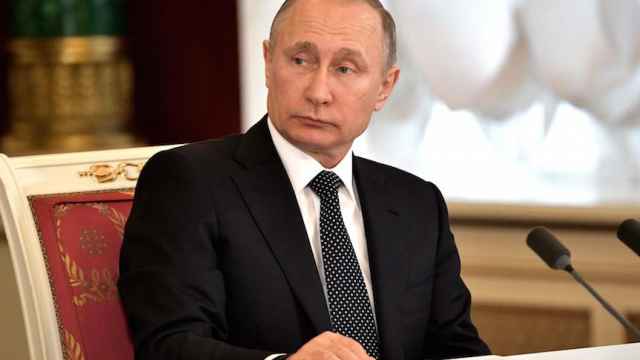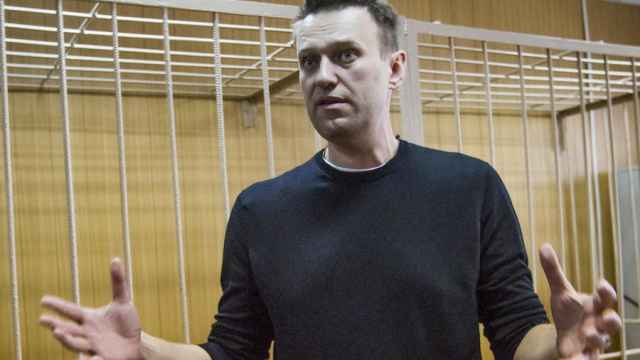Russia’s political history centers around Moscow. Anything meaningful happens in the capital, or it scarcely happens at all.
The Soviet system collapsed after thousands of Muscovites took to the city’s streets in 1991 to defend their freedom against the Communist leadership. Twenty years later, Moscow’s central squares and boulevards were the stage for the Bolotnaya protest movement.
The demonstrations in 2011 and 2012 relied largely on Moscow’s middle class and a base of Westernized, open-minded intellectuals and hipsters. They came out to denounce election fraud, and also to protest the humiliation of Vladimir Putin’s looming return to the presidency and his apparent intent to remain in power for life.
First, they rebelled at the voting booth. Then they came to Bolotnaya Square and Sakharov Avenue for major rallies — the biggest Moscow had seen in more than a decade.
But it wasn’t enough. The Kremlin soon defeated and then destroyed the Bolotnaya movement with a crackdown on its leaders. Next, the government codified this crackdown with repressive legislation designed to keep opposition leaders behind bars or too afraid to speak out.
The nail in the coffin was the ideological pressure and propaganda brought to bear against the Bolotnaya movement. At no point was this clearer than in 2014, when the annexation of Crimea fueled a new social consensus that skyrocketed Putin’s approval ratings to new heights, marginalizing any and all opposition to the president and his agenda.
The game was over. The battle was lost. Engulfed by depression, Muscovites had neither the ability nor desire to fight back.
This Sunday, years later, this was still the setting for a wave of protests that swept more than 80 cities across Russia, shocking the country’s political elite.
At this Sunday’s demonstrations, there was an unexpected twist: a new generation appears to have stepped up and announced its political arrival. Young people between the ages of 16 and 25 — Russians who can remember nothing but a country ruled by Vladimir Putin — have widely embraced Alexei Navalny’s anti-corruption platform.
In addition to being younger, these new protesters aren’t isolated in Moscow. Their movement is dispersed across Russia, and it’s relatively disorganized (perhaps making it harder to stop).
Last Sunday was the first time in recent history that more protesters reportedly turned out in St. Petersburg than in Moscow. It was also the first time in years that demonstrations took place in almost every major city nationwide. And this was the first time in a long time that the Russian opposition initiated a protest movement on its own, without waiting to react to the authorities.
Protesters marched against government corruption, embodied in Prime Minister Dmitry Medvedev, thanks to a recent investigative report by Navalny’s civic foundation. Navalny packaged the research in a sleek, satirical, hour-long YouTube video that has been viewed more than 13 million times in about three weeks. The film has been a massive success among younger Russians, and its popularity online materialized this weekend in Sunday’s surprisingly well-attended demonstrations.
Until this weekend, it was commonly assumed that today’s Russian youths are politically unambitious and apathetic. Sociological surveys indicate that most young people are pro-Putin, and a recent study by Sberbank described Russia’s youth as focused on “easy success and hedonism,” and unable to think about the future or overcome difficulties.
But there’s another side to Sberbank’s findings, which also indicate that Russian young people don’t rely as much on leaders, and are more likely to switch their loyalties suddenly, whether it’s consumer habits, fashion, or something else. They say “it’s cool to be smart,” and they inform that worldview by watching YouTube and using social networks like Instagram and Vkontakte. These Russians largely ignore the news shows on television, effectively inoculating them against the Kremlin’s most effective propaganda.
But even without TV news, Russian schoolchildren still encounter propaganda in the classroom, where the ideological pressure from teachers and administrators has been mounting for the past several years. All this religious orthodoxy and trumpeting of conservative values, however, often fails to impress teenagers. In fact, the Russian government and many Russian teens appear to have serious aesthetic differences, when it comes to politics today.
The revolt against political indoctrination in schools includes a recent string a viral videos recorded in classrooms, where students openly challenge their teachers on political canon.
What happens next? The young people Navalny drew out on Sunday are attracted to his Internet persona — his mastery of memes and his overall “coolness.” These people are not actively anti-Putin, and they’re not attempting a head-on challenge to Russia’s so-called “Crimea Consensus.”
But even Russian teens have lived long enough to know firsthand and from their families that their country is beset by corruption. Captivated by Alexei Navalny and believing that “it’s cool to be smart,” many young people are apparently keen to “teach these guys a lesson,” and Navalny has given them the perfect target in Dmitry Medvedev, an uncharismatic official whose greatest asset to Vladimir Putin has been his political buffoonery.
What’s more, today’s teenagers don’t bear the trauma of defeat that has weighed on Moscow’s progressives since 2012, when the Kremlin crushed the Bolotnaya movement. Many of the youths becoming politically conscious today weren’t even teenagers five years ago. On Sunday, they showed that they haven’t been scared yet, which is solid political capital in Putin’s Russia.
While it’s hard to assess the impact of Sunday’s surprisingly large demonstrations, it’s fair to say that Russia’s political picture has changed. Navalny is now the opposition’s undisputed leader. Prime Minister Medvedev, the protests’ main target, is now a lame duck, and it would surprise hardly anyone if he’s sacrificed in the next year, before Vladimir Putin’s likely re-election run.
Putin, meanwhile, will need to revise his re-election campaign, which is less secure now than it was a week ago. Most likely, the president will fall back on his penchant for political repression, cracking down harshly on future protests and endorsing new restrictions on online communication tools.
Whatever happens, Sunday’s explosion of youth activism reaffirms an old maxim about political regimes: Russia’s authoritarian leadership is always preparing to fight the last war, and risks losing the next one.
A Message from The Moscow Times:
Dear readers,
We are facing unprecedented challenges. Russia's Prosecutor General's Office has designated The Moscow Times as an "undesirable" organization, criminalizing our work and putting our staff at risk of prosecution. This follows our earlier unjust labeling as a "foreign agent."
These actions are direct attempts to silence independent journalism in Russia. The authorities claim our work "discredits the decisions of the Russian leadership." We see things differently: we strive to provide accurate, unbiased reporting on Russia.
We, the journalists of The Moscow Times, refuse to be silenced. But to continue our work, we need your help.
Your support, no matter how small, makes a world of difference. If you can, please support us monthly starting from just $2. It's quick to set up, and every contribution makes a significant impact.
By supporting The Moscow Times, you're defending open, independent journalism in the face of repression. Thank you for standing with us.
Remind me later.



